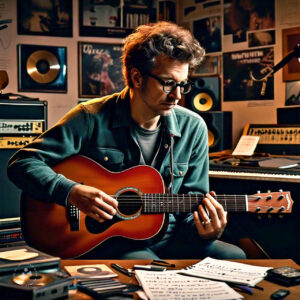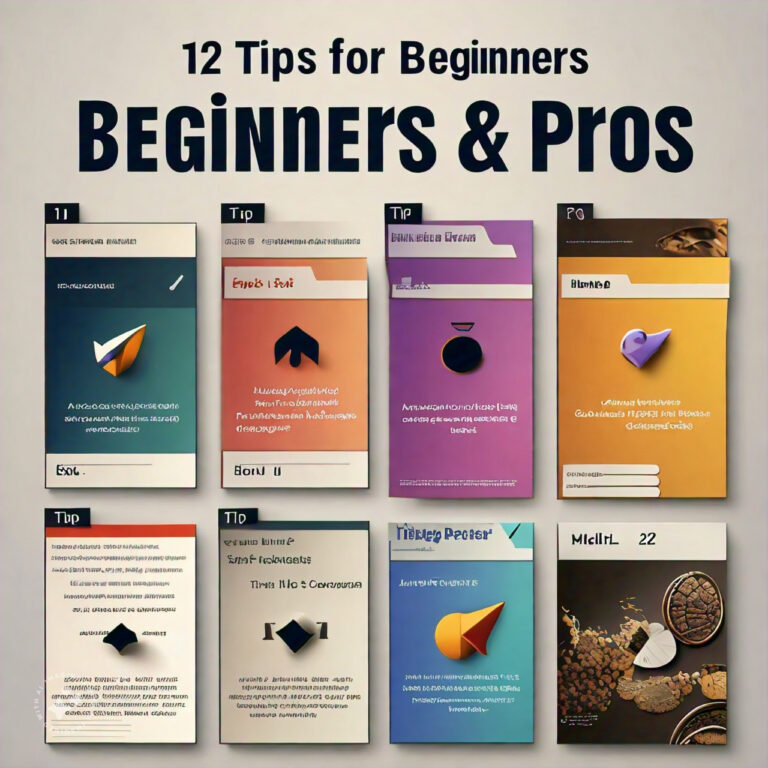Hello Musician, We have something for you, Today we are going to share with you How to Be a Better Musician. it is 12 Tips For Beginners & Pros, so If you are interested, just read this bog post to the end, you will learn a lot from this article and don’t forget, if you have any question just drop it inside the comment box below, we will attain to it.
Hey there, fellow songwriters! & Musicians
Whether you’re just starting out with a few chords and a melody in your head or you’re a seasoned pro with a catalog of hits, we all share a common goal: to constantly evolve and create music that resonates.
I’ve been in the songwriting game for a while now, and I’ve learned a thing or two about what it takes to hone your craft. So, grab your guitar, notebook, or voice recorder, and let’s dive into these 12 essential tips to help you become a better songwriter.
1. Warm Up and Practice Regularly: Building a Strong Foundation
Just like athletes warm up before a game, musicians need to prepare their instruments and voices before diving into a writing session. For singers, this might involve vocal exercises and scales. For instrumentalists, it could be practicing basic techniques or running through familiar pieces.
But warm-ups are just the beginning. Consistent practice is essential for any songwriter. It helps you build muscle memory, improve your technical skills, and develop a deeper understanding of your instrument. Aim to practice regularly, even if it’s just for 15-20 minutes each day. The key is to make it a habit.
Here are some tips for structuring your practice sessions:
- Set goals: Decide what you want to achieve during your practice time. Do you want to learn a new chord progression, write a verse, or practice your vocal technique?
- Break it down: Divide your practice time into smaller chunks, focusing on specific skills or areas for improvement.
- Track your progress: Keep a journal or record yourself to monitor your development and identify areas that need more attention.
Remember, practice isn’t just about playing your instrument. It’s about exploring new ideas, experimenting with different sounds, and developing your creative voice.
2. Master the Fundamentals: Technique and Music Theory
Now, I know what you’re thinking. “Music theory? Ugh, that sounds boring!” But trust me, understanding the fundamentals of music theory is like having a secret weapon in your songwriting arsenal.
Basic concepts like scales, chords, and rhythm are the building blocks of music. Knowing how they work together can help you:
- Write stronger melodies: Understanding scales can help you craft melodies that are both catchy and memorable.
- Create more interesting harmonies: Knowledge of chords allows you to experiment with different voicings and progressions, adding depth and richness to your songs.
- Structure your songs effectively: A grasp of rhythm helps you create songs that flow naturally and keep listeners engaged.
Don’t worry if you’re not a theory whiz. There are plenty of resources available online and in libraries that can help you learn the basics. And remember, you don’t need to be a master to benefit from music theory. Even a basic understanding can go a long way in improving your songwriting.
3. Listen Actively: Train Your Ear and Learn from Others
One of the best ways to improve as a songwriter is to listen actively to music. And I don’t just mean casually listening in the background while you’re doing other things. I mean really listening, paying attention to the details of the melody, harmony, rhythm, lyrics, and overall structure of the song.
As you listen, ask yourself questions like:
- What makes this song catchy?
- How does the melody move?
- What chords are being used?
- How does the rhythm create a groove?
- What story is the song telling?
By actively analyzing the music you love, you can learn valuable lessons from other songwriters and apply those insights to your own work.
Ear training is another crucial skill for songwriters. It involves developing your ability to recognize different notes, intervals, chords, and rhythms by ear. This can help you transcribe melodies, identify chord progressions, and create more accurate arrangements.
There are many ear training exercises and apps available online that can help you develop this skill. Even spending a few minutes each day practicing ear training can make a significant difference in your songwriting abilities.
4. Embrace Different Genres: Expand Your Musical Horizons
As songwriters, it’s easy to get stuck in a rut, writing the same types of songs over and over again. But by stepping outside of your comfort zone and exploring different genres, you can discover new sounds, techniques, and songwriting approaches that can inspire your own work.

Listen to music from genres you wouldn’t normally gravitate towards. Pay attention to the unique elements of each genre, such as the instrumentation, rhythms, lyrical themes, and song structures. Try incorporating some of these elements into your own songs to see how they can add a fresh perspective and broaden your musical palette.
Remember, there are no rules in songwriting. You can blend elements from different genres to create your own unique sound.
5. Develop Your Musicality: Creativity, Expression, and Style
Songwriting is more than just putting words and music together. It’s about expressing your emotions, telling stories, and connecting with listeners on a deeper level.
To develop your musicality, focus on these key aspects:
- Creativity: Experiment with different songwriting approaches, such as starting with a melody, a lyric, or a chord progression. Don’t be afraid to try new things and break the rules.
- Expression: Use your music to convey your emotions and experiences. Let your songs be a reflection of who you are as a person.
- Style: Develop your own unique songwriting voice. This might involve experimenting with different lyrical styles, melodic approaches, or production techniques.
One of the best ways to cultivate your musicality is through improvisation. Whether you’re playing an instrument or singing, improvisation can help you discover new ideas, melodies, and harmonies that you might not have found through deliberate composition.
6. Learn from the Masters: Analyze and Emulate Great Songwriters
Throughout history, there have been countless songwriters who have left an indelible mark on music. By studying their work, you can gain valuable insights into the art of songwriting and learn from the masters themselves.
Choose a few of your favorite songwriters and analyze their songs in detail. Pay attention to their lyrical themes, melodic choices, chord progressions, and song structures.
Try to identify what makes their songs so special. Is it the catchy melodies? The clever lyrics? The emotional impact?
Once you’ve analyzed their work, try emulating their techniques in your own songwriting. This doesn’t mean copying their songs outright. Instead, use their work as a source of inspiration and a springboard for your own creative exploration.
7. Record Yourself: Identify Areas for Improvement
Recording yourself is a powerful tool for any songwriter. It allows you to objectively assess your strengths and weaknesses and identify areas for improvement.
When you listen back to a recording, try to be as objective as possible. Notice any areas where your vocals are out of tune, your instrument playing is sloppy, or your lyrics are weak.
Don’t be discouraged if you hear things you don’t like. Everyone has room for improvement. The key is to use this feedback to make your songs even better.
You can also use recordings to track your progress over time. By comparing older recordings to newer ones, you can see how your songwriting has evolved and identify areas where you’ve made significant strides.
8. Perform Regularly: Gain Confidence and Stage Presence
Performing your songs live is an essential part of being a songwriter. It allows you to connect with your audience on a deeper level, get feedback on your material, and build confidence as a performer.
If you’re new to performing, start small. Play for friends and family, or open mic nights at local venues. As you gain experience, you can gradually work your way up to larger stages and audiences.
Performing regularly can also help you develop your stage presence. This involves learning how to command attention, engage with the audience, and deliver your songs with passion and conviction.
9. Collaborate with Others: Learn from Each Other and Grow Together
Collaborating with other songwriters can be a rewarding and enriching experience. It allows you to bounce ideas off each other, learn from different perspectives, and create music that is greater than the sum of its parts.
There are many ways to collaborate with other songwriters. You can co-write songs, share feedback on each other’s work, or simply jam together and see what happens.
The key to successful collaboration is to be open-minded, respectful, and willing to compromise. Remember, the goal is to create something special together, not to compete with each other.
10. Take Care of Yourself: Physical and Mental Wellbeing for Songwriters
Songwriting can be a demanding and emotionally draining process. It’s important to take care of yourself physically and mentally to ensure that you have the energy and focus needed to create your best work.
Here are a few self-care tips for songwriters:
- Get enough sleep: Sleep is essential for physicaland mental recovery. Aim for 7-8 hours of sleep each night.
- Eat a healthy diet: Fuel your body with nutritious foods to maintain your energy levels and support your creativity.
- Exercise regularly: Exercise can help reduce stress, improve mood, and boost creativity.
- Take breaks: Step away from your work regularly to clear your head and recharge your batteries.
- Connect with others: Spending time with loved ones can help you relax and de-stress.
If you’re struggling with performance anxiety, stress, or other mental health issues, don’t hesitate to seek professional help. There are many resources available to support musicians’ mental wellbeing.
11. Find a Mentor or Teacher: Personalized Guidance and Support
Having a mentor or teacher can be invaluable for any songwriter. A mentor can provide personalized guidance, feedback, and support, helping you navigate the challenges of the music industry and reach your full potential as a songwriter.
A mentor can also offer valuable insights into the songwriting process, sharing their own experiences and knowledge to help you improve your craft.
If you’re looking for a mentor, start by reaching out to songwriters you admire or respect. You can also attend songwriting workshops or conferences, where you’ll have the opportunity to meet and learn from experienced professionals.
12. Enjoy the Journey: Embrace the Challenges and Celebrate Progress
Songwriting is a journey, not a destination. There will be ups and downs, challenges and triumphs. The key is to enjoy the process, embrace the challenges, and celebrate your progress along the way.
Don’t get discouraged if you don’t see results immediately. Songwriting takes time, patience, and dedication. But with hard work and perseverance, you can achieve your goals and create music that truly matters.
FAQs for Aspiring Songwriters
How do I find inspiration for my songs?
Inspiration can come from anywhere: personal experiences, observations, conversations, books, movies, nature, etc. Keep a notebook or voice recorder handy to capture ideas as they come to you. Experiment with different songwriting prompts or exercises to spark your creativity.
How do I know if my song is good?
The best way to gauge the quality of your song is to get feedback from others. Share your song with trusted friends, family, or fellow musicians. You can also join online songwriting communities or forums to get feedback from other songwriters.
How do I protect my songs from being stolen?
Copyright your songs as soon as they are completed. You can do this online through the Copyright Office website. Consider registering your songs with a performing rights organization (PRO) like ASCAP or BMI to ensure you get paid when your songs are played publicly.
How do I get my songs heard by others?
There are many ways to get your songs out there. You can perform them live, submit them to online music platforms, or pitch them to music supervisors for film and TV placements. You can also create your own website or social media pages to promote your music.
What are some common mistakes that songwriters make?
Some common mistakes include:
- Overcomplicating things: Keep your songs simple and focused.
- Ignoring feedback: Be open to constructive criticism from others.
- Giving up too easily: Songwriting takes time and effort. Don’t get discouraged if you don’t see results immediately.
I hope these tips and FAQs help you on your songwriting journey. Remember, the most important thing is to keep writing, keep learning, and most importantly, have fun!
Let me know if you have any other questions.


